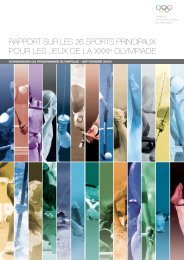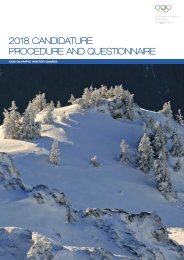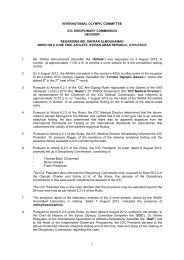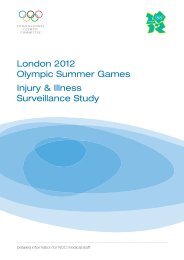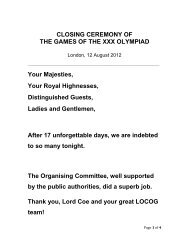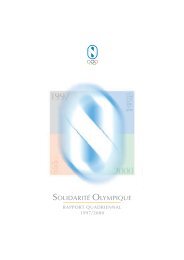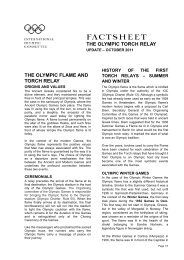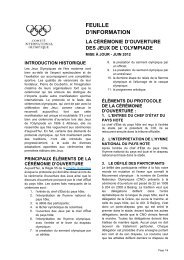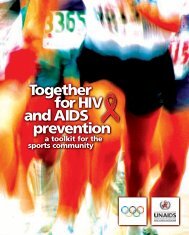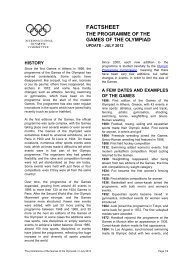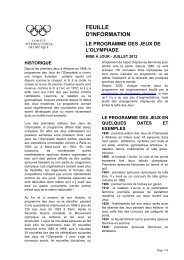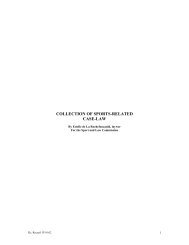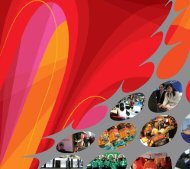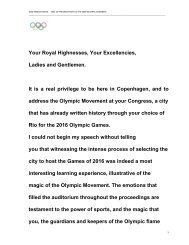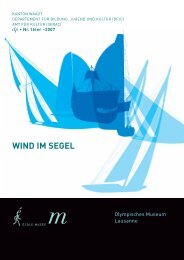8th WORLD CONFERENCE ON SPORT AND THE ENVIRONMENT
8th WORLD CONFERENCE ON SPORT AND THE ENVIRONMENT
8th WORLD CONFERENCE ON SPORT AND THE ENVIRONMENT
You also want an ePaper? Increase the reach of your titles
YUMPU automatically turns print PDFs into web optimized ePapers that Google loves.
Topic: Catering, Food and Beverage<br />
by Mr Craig Lear,<br />
Director Snow Clearing, Cleaning and Waste,<br />
and Venue Food and Beverage, VANOC<br />
<strong>8th</strong> World Conference on Sport and the Environment<br />
International Cooperation and Development Department<br />
Report<br />
Mr Lear had worked on waste management with the Sydney 2000 Summer Olympic Games. He<br />
stated that the most important message to potential contractors is: If you want to do business<br />
with VANOC, there are important performance conditions that must be met.<br />
He also discussed the opportunity to send an advance positive message to athletes, spectators,<br />
and media that when you come to Vancouver to enjoy the Games, we want you to do things<br />
responsibility.<br />
The goals are:<br />
1. To reduce the ecological footprint<br />
2. To promote healthy eating, where possible<br />
3. To work with caterers to reduce food waste via composting<br />
4. To reduce product packaging waste by talking to suppliers; having compostable utensils made<br />
with corn starch.<br />
It is important to have sponsors on board and to work towards waste reduction:<br />
1. Coca Cola makes shirts using recycled bottles. It is also working on its fl eet effi ciency and using<br />
the fl eet to transport recyclable bottles to the recycling depot<br />
2. Molson and Vincor will also assist in managing returnable bottles.<br />
The challenges:<br />
1. Space: There must be the right amount of space to set up waste streams<br />
2. Cost: Must ensure that Vancouver sets an example to use resources in a better way<br />
3. Availability of local produce<br />
4. Consistency across venues.<br />
Discussion<br />
Question: Is there a means to ensure that there is fresh drinking water without bottles?<br />
Answer: answered that there must be a product with integrity, such as working with Coca Cola<br />
and Dasani water, and PET recycling.<br />
Question: Is the provision of hot food taken into consideration and is dealing with this is more<br />
diffi cult in the Winter Games?<br />
Answer: VANOC is focusing on fresh produce. But there are challenges concerning hot food in<br />
the Winter Games, although alternatives are being considered, such as hot vegetable soup.<br />
Comment: It would be useful to have a list of suppliers that provide sustainable products/<br />
supplies, such as a list of national providers, as well as a list of Lower Mainland suppliers.<br />
Statement was made that VANOC will be working on this.<br />
Statement by VANOC that the 2010 Commerce Centre will have a list of suppliers that organisations<br />
can look to.<br />
It was also stated that VANOC had discovered that:<br />
1. Food is cultural, personal and complex<br />
2. Food issues must be thought about early to lessen potential problems.<br />
The case study of the 2004 FA Cup Final was also discussed: 73,000 spectators and the visitor<br />
ecological footprint on food and drink identifi ed that meat had more of an impact than vegetables.<br />
Page 22 / 80



